Savory Variations: Pesto Palmiers; Herbs and Cheese Palmiers
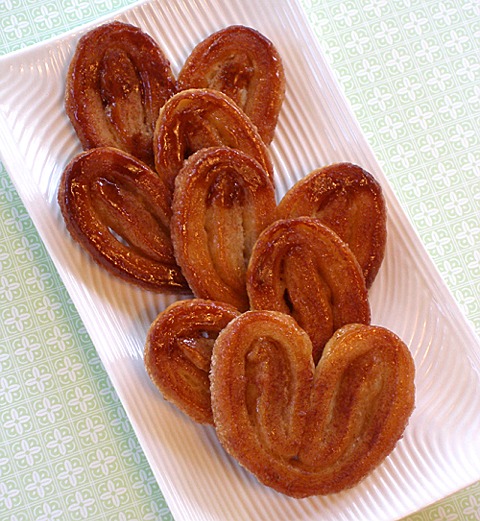
Palmiers, also known as elephant ears or palm leaves, are a crispy delicacy made from Puff Pastry dough, sprinkled with granulated sugar, folded and rolled several times, then cut into thin strips. After baking, these golden brown, caramelized pastries make a delicious treat to have with tea or coffee and the cinnamon sugar variation taste like all the very best bits of a cinnamon bun…buttery and luscious!
There are two main steps to making Puff Pastry – first the dough portion, called Puff Paste, is made, and then, and the roll-in fat portion is formed, typically made from butter. It is is made by first enclosing a “butter block” in dough, which is then folded and rolled out numerous times, called “turns” to create hundreds of alternating thin layers of pastry and butter, the result known as a laminated dough. Puff Pastry expands greatly when baked!
The leavening in Puff Pastry is derived when the moisture in the dough itself turns to steam and the air trapped there, as well, expands when heated, causing the pastry to puff and separate into hundreds of flaky and thin layers, pushing it upwards and outwards in every direction. The pressure from the steam also gives the effect of an upward lift, similar to the way in which a hovercraft works. The pressure is contained within each sheet of dough because it is sealed in between the thin layers of butter. When the pastry bakes, the butter is absorbed into the dough and the pastry sheets set, giving you crispy and buttery thin layers of dough.
PASTRY RECIPE HELP
INGREDIENTS
1 pound Puff Pastry Dough
3/4 cup granulated sugar
Cinnamon sugar mixture, optional:
2 tablespoons granulated sugar
1 teaspoon ground cinnamon
SARAH SAYS: If the puff pastry is frozen, allow time to thaw in its wrappers in the refrigerator before using.
STEP I: MAKE THE PALMIERS
1. Remove puff pastry from the refrigerator and generously sugar your work surface.
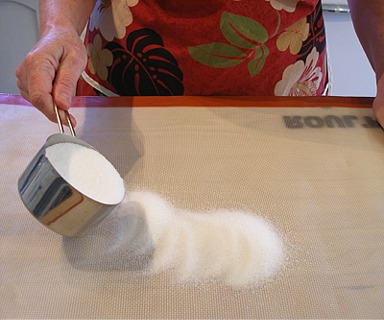
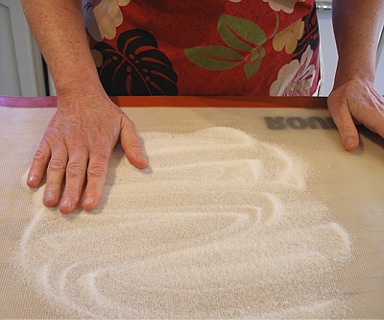
2. Place puff pastry on sugared work surface and sprinkle the top of the dough with sugar.
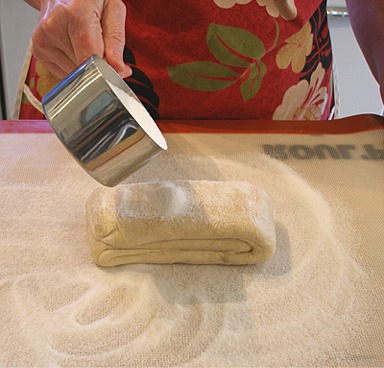
3. Press dough down, with your rolling pin, creating a rough square shape, then sprinkle more sugar on top.
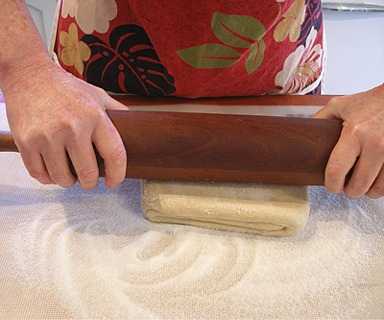
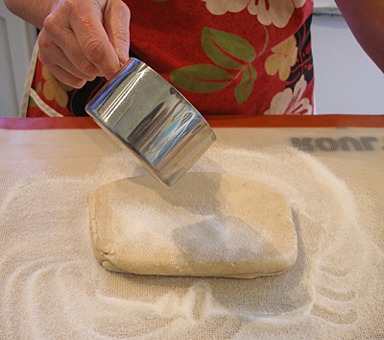
4. Roll dough into a 12- to 13-inch square, re-sugaring, if the rolling pin starts to stick. Move dough around a bit, while rolling, to make sure it is not sticking to your work surface. If it begins to stick, throw some more sugar underneath the dough.
The dough will be about 3/16-inch thick.
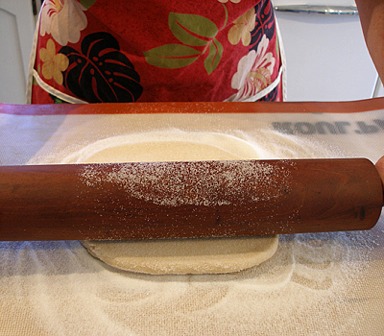
5. When you have finished rolling the dough, mark the center by gently pressing the center of the dough with a long handled wooden spoon or a cooking chopstick.
This will help you visualize the center, when you fold the palmier.
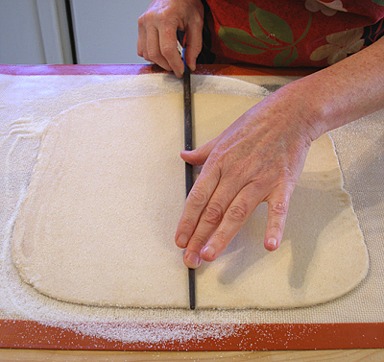
6. Fold in the sides of the square toward the center, going halfway to the marked midpoint.
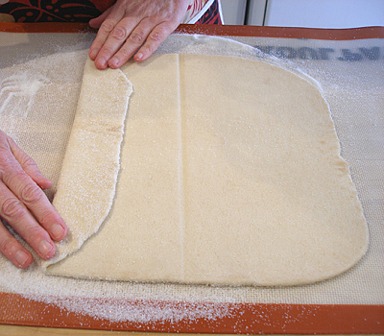
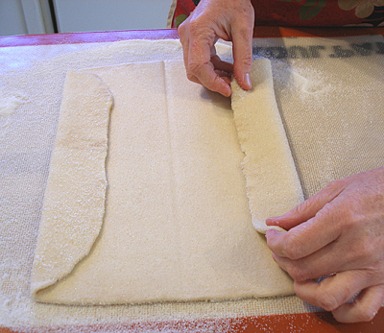
7. Fold the sides in again, so they meet at the midpoint of the dough.
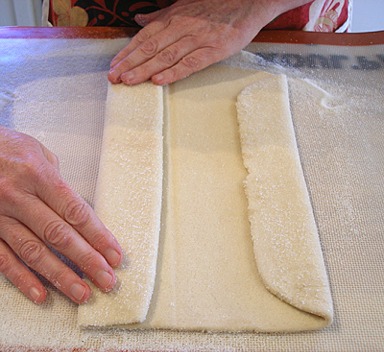
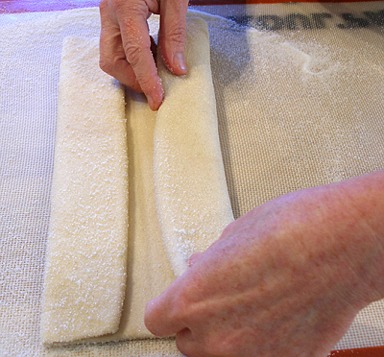
8. GENTLY roll over the folds with your rolling pin. This will help the palmier hold their shape when you bake them.
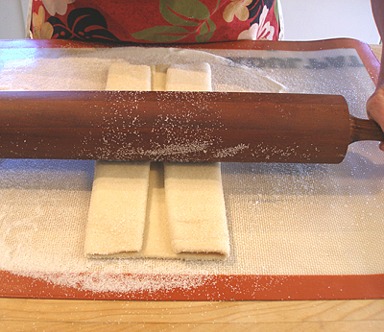
9. Fold the dough in half at the midpoint and GENTLY roll over the dough with your rolling pin.
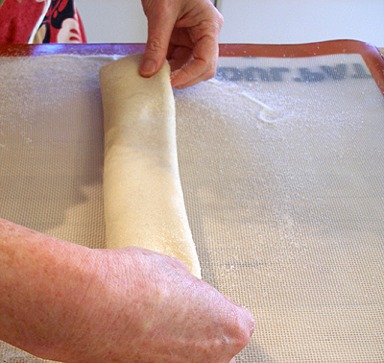
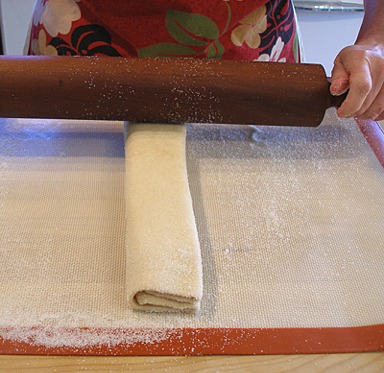
10. Place the folded dough on a silpat, or parchment lined baking sheet and place in the refrigerator for 20 minutes.
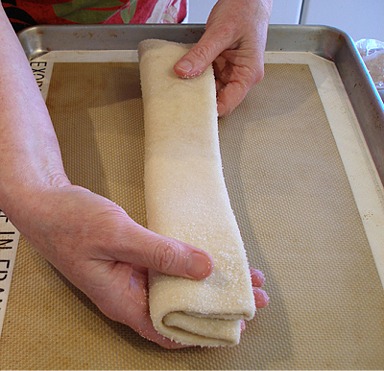
STEP II: BAKE THE PALMIERS
1. While dough chills, place rack in the center of the oven and preheat the oven to 400 degrees F.
2. After 20 minutes, remove dough from the refrigerator and cut the dough, with a sharp knife, into 3/8-inch slices.
NOTE: You can score the dough with the sharp knife before slicing.
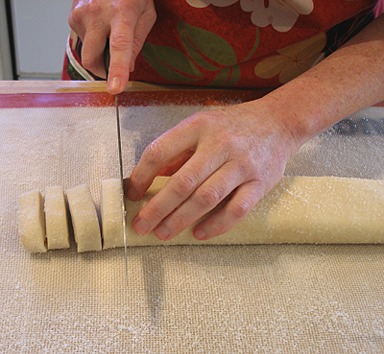
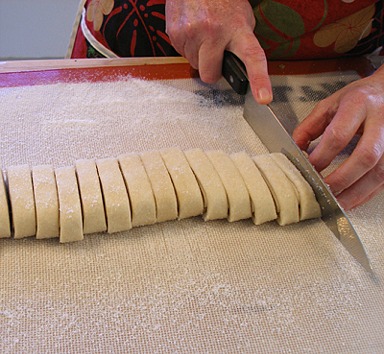
3. Mix the cinnamon sugar mixture: mix the sugar and cinnamon together in a small bowl and place it on a plate. If you do not wish to make the cinnamon sugar variation, you may omit the cinnamon and just put the plain sugar on the plate.
4. Dip both cut sides of the palmier into the cinnamon sugar and then place on a silpat (or parchment) lined baking sheet, leaving at least 3-inches between them, to allow for spreading.
NOTE: I fit 12 palmier on one sheet and baked the rest on another sheet, keeping the second sheet in the refrigerator while the first sheet baked.
The roll ends will not be as pretty as the interior slices, but bake them too, because they are way too tasty to waste!
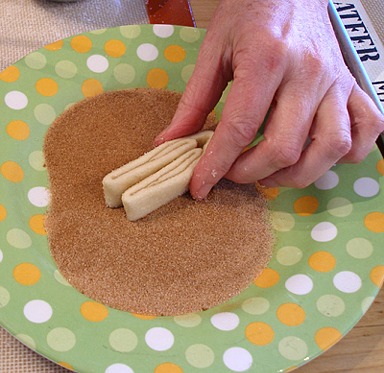
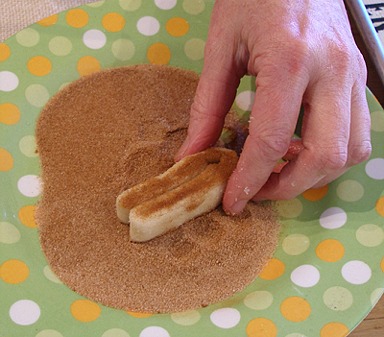
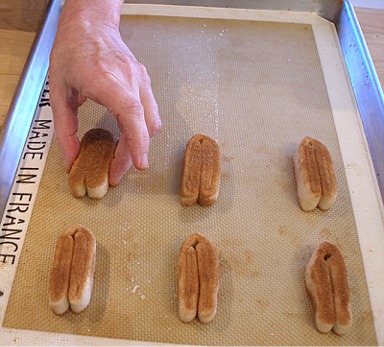
5. Gently spread the top of each palmier with your fingers, then place in the oven to bake.
Do not pinch the dough together at all while doing so.
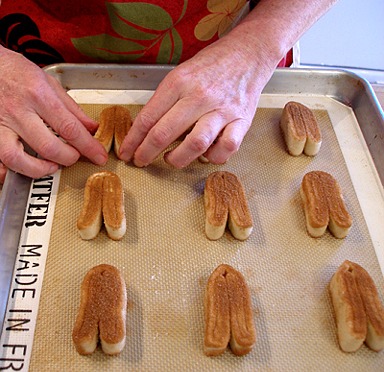
6. Bake palmier for 6 minutes on one side, or until the sugar is caramelized.
Then, flip the palmier over, with a spatula, and bake an additional 3-5 minutes, until the sugar on the other side has caramelized.
Be careful, the palmier can go from caramelized to burnt very quickly!
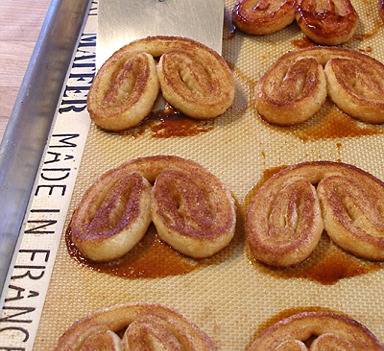
KELLY CA SAYS: You may also bake them entirely on one side, without flipping, if you like, but the top side will not be as crunchy as the bottom.
If you prefer them this way, bake on one side only, for 10-12 minutes.
7. Transfer each to a wire cake rack to cool completely.
STORAGE
Dough, without cinnamon sugar, can be chilled, wrapped well, up to 2 days or frozen up to 1 month. Thaw the dough, in its wrappers in the refrigerator.
Keep cookies in an airtight container at room temperature, for 3 to 4 days. Recrisp in a 300 degrees F until heated through, about 5 minutes.
SAVORY VARIATIONS
PESTO
1/3 cup packed fresh basil leaves
3 tablespoons fresh grated Parmesan cheese
1 clove garlic cloves, crushed
1/4 cup olive oil
1 large egg yolk
1/2 teaspoon water
INSTRUCTIONS
1. In a food processor fitted with a steel blade, pulse together the basil, Parmesan cheese, garlic, and olive oil until it forms a finely textured paste.
2. Right after STEP I, #5, above, brush the pastry evenly with a very thin layer of pesto, before folding and rolling. Avoid spreading within 1/4-inche from the edges of the large square.
Proceed with STEP #6 – 10, above.
3. While dough chills, position an oven shelf in the middle and preheat the oven to 400 degrees F.
Line a baking sheet with parchment paper or a silpat, nonstick baking mat.
4. In a small bowl, beat together egg yolk and water. Brush the tops of the palmiers with it.
5. Place pan into the oven and bake until golden on one side, about 15 minutes.
6. Transfer each to a wire cake rack to cool completely.
HERBS AND CHEESE
INGREDIENTS
1 tablespoon olive oil
1 ounce (about 1/4 cup) finely grated extra-sharp white cheddar
3 tablespoons fresh finely grated Parmesan cheese
1 tablespoon finely chopped fresh oregano
1 tablespoon finely chopped fresh sage
1 tablespoon finely chopped fresh thyme
1/4 teaspoon salt
1 large egg yolk
1/2 teaspoon water
INSTRUCTIONS
1. Right after STEP I, #5, above, brush the dough lightly with extra virgin olive oil. Scatter cheddar and Parmesan over the top.
Sprinkle the oregano, sage, thyme and salt evenly over the cheese.
2. While dough chills, position an oven shelf in the middle and preheat the oven to 375 degrees F.
Line a baking sheet with parchment paper or a silpat, nonstick baking mat.
3. In a small bowl, beat together egg yolk and water. Brush the tops of the palmiers with it.
4. Place pan into the oven and bake until golden on one side, about 15 to 20 minutes.
5. Transfer each to a wire cake rack to cool completely.


